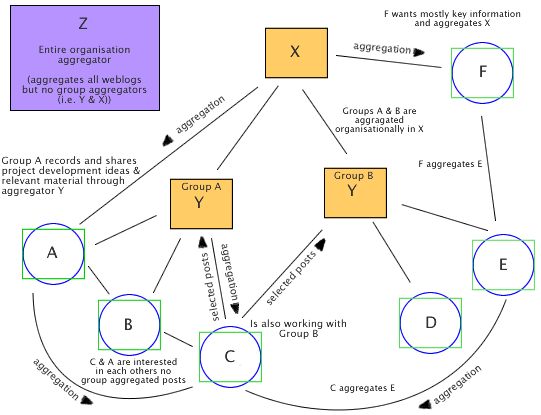 I’ve posted a draft version of my blogtalk paper Centered Communication: Weblogs and aggregation in the organisation over at IncSub. I’m not about to rewrite it all… noooooo way :o)… but feedback / comments would be really cool. It’s a kind of mismash of Christopher Alexander, Ulises Mejias and a sprinkle of me complaining about discussion boards and going on about how RSS and blogs are the answer to everything ;o)
I’ve posted a draft version of my blogtalk paper Centered Communication: Weblogs and aggregation in the organisation over at IncSub. I’m not about to rewrite it all… noooooo way :o)… but feedback / comments would be really cool. It’s a kind of mismash of Christopher Alexander, Ulises Mejias and a sprinkle of me complaining about discussion boards and going on about how RSS and blogs are the answer to everything ;o)
Here’s the abstract:
Centered Communication: Weblogs and aggregation in the organisation
Over the last decade business, educational and community organisations have attempted to enhance their operations through utilizing the web. A significant amount of this effort has been directed towards the development and management of internal communities, employee knowledge and organisational information. To this end, complex and powerful tools have been sourced, developed and implemented to create intranets, learning management systems, community sites, portals and virtual team spaces.
However, while many organisational communication processes have been revolutionised by direct interpersonal communication through email and Instant Messaging (IM), only limited successes have been achieved through the use of these web-based environments. It is argued that this has occurred as a result of the limitations in design of tools brought about by a tendency to embrace tree-like and centralised principles and their associated technological solutions.
In light of these arguments, this paper outlines an alternative, centred (as opposed to centralised) approach to online communication. In doing this, an organisational online communication model based around the use of weblogs and aggregation is presented and discussed in relation to its application in a large, distributed and complex setting. Key to this model are the assumptions that ownership, control, independence, choice and design for subversive use are critical in establishing conducive, motivating, authentic and effective online communication and knowledge environments.